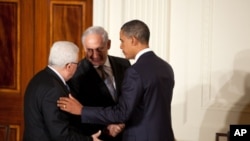Multiple U.S. leaders over the decades have pushed for it, but there is still no lasting peace in the Middle East.
U.S. President Barack Obama's Mideast Envoy George Mitchell says this should not deter the United States. "The cause of peace is so important, so just, indeed - I'm not trying to use hyperbole - so noble, that it must continue notwithstanding prior efforts' failure," he said.
Mr. Obama vowed to press for a two-state solution during his speech in Cairo six months into his presidency. "That is in Israel's interest, Palestine's interest, America's interest, and the world's interest. And that is why I intend to personally pursue this outcome with all the patience and dedication that the task requires," he said.
Notre Dame University Professor Michael Desch, like many Mideast analysts, is skeptical that direct talks that began this month will yield success. Desch says obstacles include the Palestinian militant group Hamas, which rules the Gaza Strip, and what he describes as Israeli Prime Minister Benjamin Netanyahu's reluctance to embrace the idea a two-state solution.
"The optimist might say that President Obama is committed to this issue, made a historic speech in Cairo reaching out to the Arab and Islamic world, and is beginning this effort relatively early in his first term in office. But I think the structural obstacles to successful peace negotiations are just huge," he said.
George Mitchell says he believes the president will succeed, even though the president himself acknowledges that the outcome is uncertain, and the goal is agreement on major issues within one year. Mitchell said whatever the outcome, "it isn't going to be because time ran out at the end."
Robert Danin, of the Council On Foreign Relations, points out that Mr. Obama is less than halfway into his first term in office. He says this gives him leverage. "Starting with a great deal of time left in the administration means that President Obama still calls the shots. Whereas previous presidents were up against a wall. They were up against the end of their administrations, and the parties knew it, and they were able to play that against the United States," he said.
Danin says he does not think the Israeli and Palestinian leaders will want to anger or embarrass a U.S. president who could be in office for another two to six years. "I don't believe that this is the graveyard for American presidents, but pursuing Israeli-Palestinian peace, Arab-Israeli peace, is not a domestic vote getter," he said.
President Jimmy Carter brought together Egyptian President Anwar Sadat and Israeli Prime Minister Menachem Begin for the Camp David Accords in 1978. President George H.W. Bush took part in the Madrid peace conference in 1991, with Israeli and key Arab leaders in attendance.
Neither U.S. president was re-elected.
Now, the wars in Iraq and Afghanistan, the economy, elections and other issues all compete for attention with Mideast peace.
Ian Lustick, a professor at the University of Pennsylvania, says that makes a Palestinian-Israeli peace deal that much harder to achieve. "It is hard to imagine even in the best of circumstances President Obama solving that problem, of being able to attend to this and almost only this issue over a significant period of time for the next year, which is almost what's necessary," he said.




